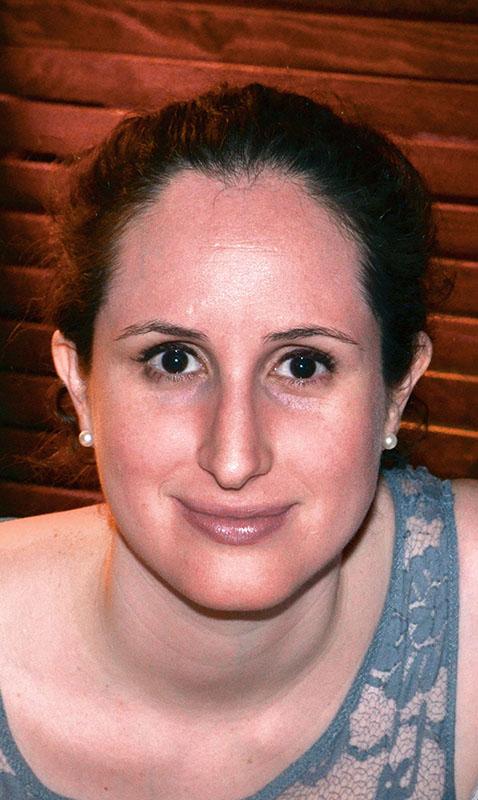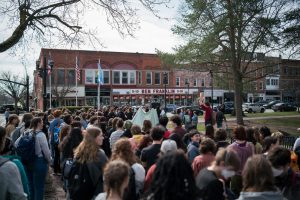Off the Cuff: Gilda Rodríguez, visiting assistant professor of Comparative American Studies and recent keynote speaker
Oberlin Visiting Assistant Professor, Gilda Rodríguez, participated in Wednesday’s Keyword: Citizenship panel discussion.
September 26, 2014
Oberlin Visiting Assistant Professor of Comparative American Studies and Politics Gilda Rodríguez participated in the Sept. 24 Comparative American Studies Keyword: Citizenship panel discussion. Rodríguez joined fellow Oberlin professors Steven Williams, Harrod Suarez and Gina Pérez in Wilder 101 to discuss the many dimensions of citizenship. She spoke with the Review about the concept of citizenship in the U.S. and Mexico.
What was the goal of the Keyword: Citizenship panel?
To open up dialogue about citizenship. It’s something that a lot of us in Comparative American Studies are thinking about, but also something that a lot of students have expressed interest in talking about. [Citizenship is] something that is sort of a common theme in a lot of our classes.
The keyword last year was privilege. The idea is to choose a word that is sort of buzzing around that people are interested in talking about; that there’s sort of already a conversation going on around on campus, in classes, in the research that people are doing, [that] the faculty are doing, and just general conversations that people are having on campus — and having a space, a dedicated space, to have this conversation.
How do you think citizenship is defined in America?
Well, like I said in my little talk, I think that we have many different definitions of citizenship and that when we talk about citizenship we have so many different ideas about it. … We are often talking at sort of cross purposes about [the different definitions of] what citizenship is. The idea that one person has is not the idea that the person they’re talking to might have about citizenship. But I do think there is an overemphasis in U.S. discourse on legal status and belonging to a nation state. … I think [this] is misguided, and I wish there was more of an emphasis on the doing of citizenship, the act of citizenship, on people being engaged in their communities, being politically active. In the panel there was a distinction between the being and the doing of citizenship. And I think we tend to emphasize in U.S. discourse the being versus the doing. I wish we emphasized more the doing, and it bothers me that the being of citizenship is also too weak to serve [as] official recognition by the state.
You’ve done some work in Mexico. Do you think the definition of citizenship, how people think of citizenship there, is significantly different than the U.S.?
Not overall. Not in the mainstream. I think that citizenship in Mexico, among people in general, that the mainstream of Mexican society is very similar [to that of the U.S.]. I specifically work on indigenous populations that migrate from their communities to other parts of Mexico and increasingly to the United States. So for them, the identity of Mexican, or considering themselves Mexican citizens, may not be their primary identity or might not be an identity that’s useful to them or that they claim.
They primarily see themselves as [a] member of their hometown community, their indigenous communities. Those communities are the ones they’re invested in, that they primarily participate politically in, but that’s something if they’re not engaged with Mexico and if they come to the United States, with U.S. politics, if they have to contend with them. So in that sense, there are people within Mexico to whom citizenship means something else. But for the bulk of Mexicans, the understandings of citizenship are very similar to the majority of the U.S. I’m Mexican myself. I grew up in Mexico. The understandings of citizenship, the everyday discourse and media discourse are not that different [ from that of the U.S.].
How do you think the possession of legal citizenship affects people’s social or political interaction with the community?
The possession of legal citizenship is always a huge privilege. … In my work … with so many people who are undocumented, it’s clear to me that having legal citizenship is such a huge privilege, and I work with people who are, as they call them, doubly undocumented … who don’t have any type of documentation from the Mexican state. They don’t have birth certificates or Mexican passports or anything like that. So even in Mexico they have trouble getting recognized. Even if they never leave Mexico they have trouble having access to rights. So legal status is a huge privilege in many ways.
The doing of citizenship is not necessarily connected to that. These people who do not have legal status and are not necessarily constrained by that, they can still engage in politics. I know people who are extremely active despite that. … The lack of status does keep them back [ from] the possibilities for actions. The possibilities for mobility are extremely limited.
At the same time, I think that having legal status in the nation-state … means that sometimes we get really complacent. There’s not much required from us. As a U.S. citizen — I’m not a U.S. citizen myself, but when one is a U.S. citizen — there’s not much required of you. There’s not compulsory voting, for example, in the U.S. Other countries have that. But other than jury duty, if you get called to do that, there’s not very much you have to do. You have to pay taxes, right? That is pretty much all you have to do. And even that, some rich people like Eduardo Saverin, who is one of the founders of Facebook, for example, he gave up his U.S. citizenship. He moved to Singapore and gave up his U.S. citizenship so he won’t have to pay taxes.
And there’s other sort of things, cases, but that’s sort of in terms of the economic dimension of them. But it doesn’t require a whole lot of you. So those two dimensions, the being and the doing, are connected. There’s a connection that goes on. … Legal status I think is a privilege, but it also allows many of us to forget the practical dimension.


























